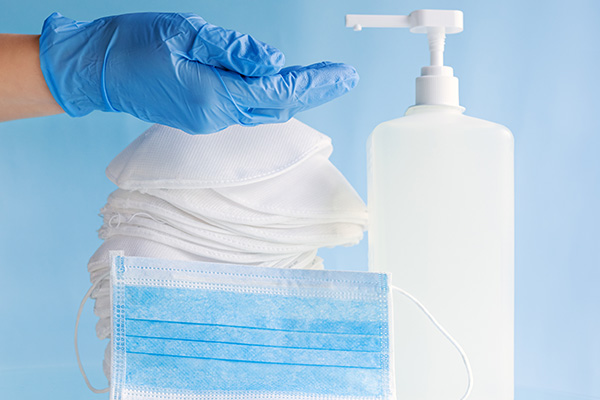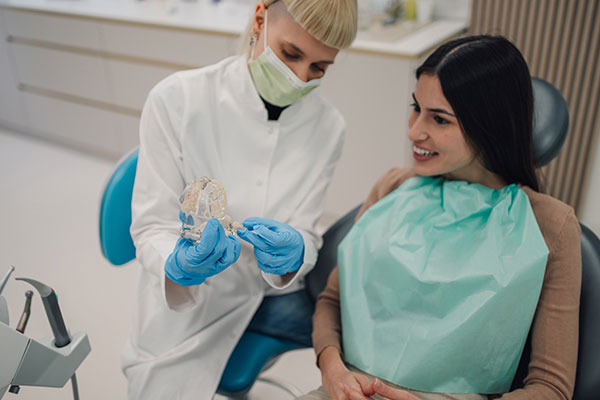What PPE per CDC Guidance Do Dental Workers Need During COVID-19?

As a dental patient, you should know that the use of PPE per CDC guidance is crucial for reducing the risk of cross-infection to ensure high-quality care and protect patients and dental staff. The term "PPE" refers to the personal protective equipment that a dental professional may use during a dental procedure. PPE is part of standard precautions for infection prevention and control. Along with other infection control measures, PPE can help minimize the chances of exposure to infection.
PPE for dental workers
The personal protective equipment required by dental workers during the COVID-19 outbreak includes the following.
Protective eyewear
Dental workers need to use protective eyewear with solid side shields or a face shield with a mask to protect their eyes from aerosols, splash or spatter. Normal glasses do not provide adequate protection because they do not have side protection. The protective eyewear should be worn during dental procedures and during manual cleaning of dental instruments.
Gloves
Proper hand hygiene and wearing gloves are effective in preventing disease transmission. There are appropriate gloves for specific tasks. Dental workers need to wear sterile, single-use gloves for surgical procedures and non-sterile gloves for routine dental care. Puncture-resistant, heavy-duty utility gloves should be used if there is a risk of exposure to pathogens or chemicals, especially when handling contaminated instruments or disinfectants during cleaning.
Masks and respirators
These are PPE for the face. Traditional single-use masks serve as a shield against spatter but typically do not protect the person from aerosol inhalation effectively. Respirator masks filter air before inhalation and eliminate microbes.
Dental professionals are often worried about the splash and spatter of likely infectious aerosols and chemicals to mucous membranes or entry gateways. The use of an appropriate mask and eyewear can help stop this issue.
Aprons and gowns
These are PPE for the body. Single-use disposable aprons are usually worn over a dental uniform or other clothing to serve as a barrier to fluids. Dental uniforms and footwear are not regarded as PPE because they do not shield the body from body fluids. However, they are a basic part of dental wear for every dental staff, as they ensure a smart, professional look. Protective clothing, including lab coats and disposable gowns, prevent contamination of skin and regular clothing.
It is important to select the correct dental uniform as well. Dental workers should use short-sleeved uniforms with bare arms. They need to change uniforms regularly and wash them at suitable temperatures to prevent cross-infection. Open-toed footwears are not appropriate. No protective clothing or shoes should be worn outside of the dental practice. Dental workers should change inside the practice.
It is vital to avoid touching the face and reduce contact with surfaces in the patient environment. Gloves should be discarded if torn or severely contaminated and changed before the next patients. Hand hygiene is important after glove disposal. Single-use items should be treated as hazardous clinical waste and handled according to proper protocols.
In conclusion
Dental workers are aware of the use of PPE per CDC guidance, including the sequence of putting on and removing PPE. Knowing how to wear and handle the PPE is important to curb the spread of infection. Verify with your dental office that the staff is taking the appropriate precautions before making an appointment.
Request an appointment here: https://thechesterfielddentist.com or call Chesterfield Dentist at (804) 412-0867 for an appointment in our Chester office.
Check out what others are saying about our services on Yelp: Read our Yelp reviews.
Recent Posts
As a child’s mouth and teeth develop into adolescence, it may become apparent that there are problems with alignment or spacing. Invisalign® for teens presents an alternative to traditional metal braces but without sacrificing the quality of results of corrective treatment. The specifics of a teen’s condition may impact the eligibility of this alignment option,…
Gum disease is a common yet serious oral health issue that can cause discomfort, damage, and even tooth loss if left untreated. With the right gum disease treatment, patients can not only stop the infection in its tracks but also restore the patient's overall oral health. Knowing the true impact of gum disease and how…
A popular way to straighten teeth without traditional braces is Invisalign®. Clear aligners are available for both adults and teenagers who are interested in improving the alignment of their teeth and improving the appearance of their smiles. The aligners are not visible in the mouth and do not have metal components that can irritate sensitive…
If you are a teenager whose dentist recommends Invisalign to straighten your teeth, you may wonder what the product is. Many dentists advise Invisalign® for teens as a discreet and reliable method of treating crooked teeth. However, you may only be familiar with traditional braces. Invisalign is a different way to fix malocclusions or imperfect…


